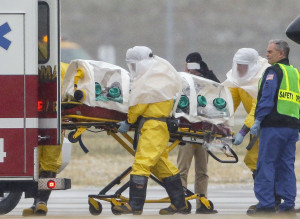Dr. Martin Salia was in the 13th day of his illness when he reached Omaha on Saturday. It took three days for him to be formally diagnosed after an initial test for Ebola came back negative and then another five days to be flown to the United States.
By the time the 44-year-old Maryland man got to the University of Nebraska Medical Center in Omaha, the deadly virus had done too much damage, shutting down Salia's kidneys and making breathing difficult, doctors said. He died Monday.
"In the very advanced stages, even the modern techniques we have at our disposal are not enough to help these patients once they reach a critical threshold," said Dr. Jeffrey Gold, chancellor of the medical centre.
Sierra Leone's government said it was shocked to learn that Salia was dead and questioned whether "the strain of the 16-hour trip could have had a negative impact on his recovery."
The virus has already killed more than 5,000 people in West Africa.
Salia, who chose to work in his homeland despite more lucrative opportunities elsewhere, was first tested for Ebola on Nov. 7, but the test was negative, and he was discharged from a treatment centre in Sierre Leone.
It's not unusual to see false negative tests for Ebola in the early stages because the amount of the virus in the bloodstream is still low, said Dr. Phil Smith, the infectious-disease expert who leads the Nebraska Medical Center's biocontainment unit.
The U.S. government warns doctors to be wary of possible false negative tests for Ebola.
Salia tested positive for the disease on Nov. 10 but did not arrive at an Omaha hospital until Saturday.
Two other Ebola patients treated in Omaha this fall arrived at the hospital roughly a week earlier in their illnesses, before nausea, vomiting and more serious symptoms set in. Both of those men recovered.
Government officials in Sierra Leone promised a full investigation into the treatment Salia received.
"At this point, we can't say for certain whether it was this misdiagnosis or not that led to his death," Deputy Information Minister Theo Nicol said in a statement to The Associated Press. The government planned to request a full medical report from the hospital where he was last treated.
Salia, a permanent U.S. resident, was reportedly receiving blood from an Ebola survivor while in Sierra Leone, the government statement said. The treatment is believed to provide antibodies to fight the virus.
Doctors with an air-transport service assessed Salia in Sierra Leone last week before deciding he was stable enough for the long flight to Nebraska.
In Omaha, Salia was placed on kidney dialysis and a ventilator and was given several medications, the hospital said. He was given the experimental Ebola drug ZMapp and received another plasma transfusion from an Ebola survivor.
"I know that we gave him every possible chance to survive. I think that his family feels confident in that as well," Dr. Daniel Johnson said Monday at a news conference.
Salia's wife, Isatu Salia, who lives in New Carrollton, Maryland, said Monday that the family believed he was treated "in the best place possible."
But by the time her husband arrived in Omaha, he was already unresponsive, doctors said.
In a Friday telephone interview, she said she had spoken to her husband and prayed with him. Although his voice sounded weak and shaky, she said he told her "I love you" in a steady voice.
Salia graduated from the Pan African Academy of Christian Surgeons training program in 2008. He was free to practice anywhere he wanted, but he chose to stay in Sierra Leone, where the need for surgeons is immense.
"He honestly believed that's what God wanted him to do," said Bruce Steffes, executive director of the academy.
Salia was a member of a United Brethren Church congregation in Sierra Leone, and the church helped support his medical training.
Jeff Bleijerveld, director of global ministries for the church, knew Salia through missionary work. He said Salia's death is a testament to "his Christian faith, his willingness to, if necessary, lay down his life for others."
Original Article
Source: huffingtonpost.ca/
Author: CP | By Josh Funk And Nelson Lampe, The Associated Press

No comments:
Post a Comment